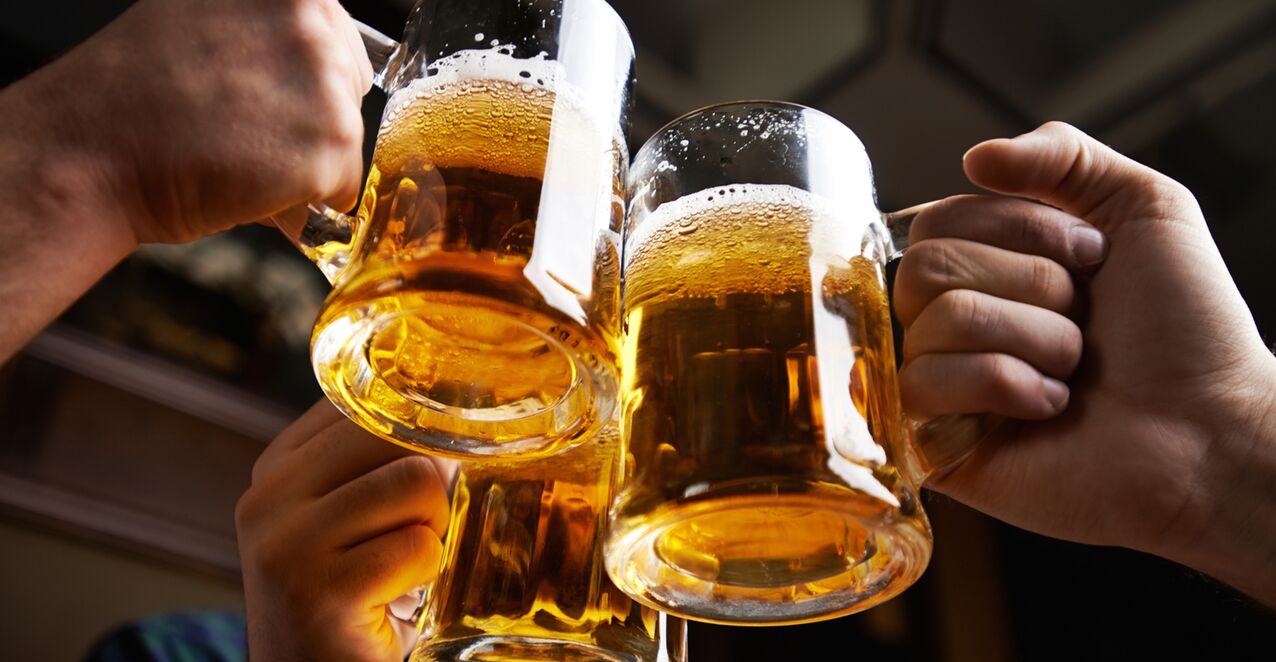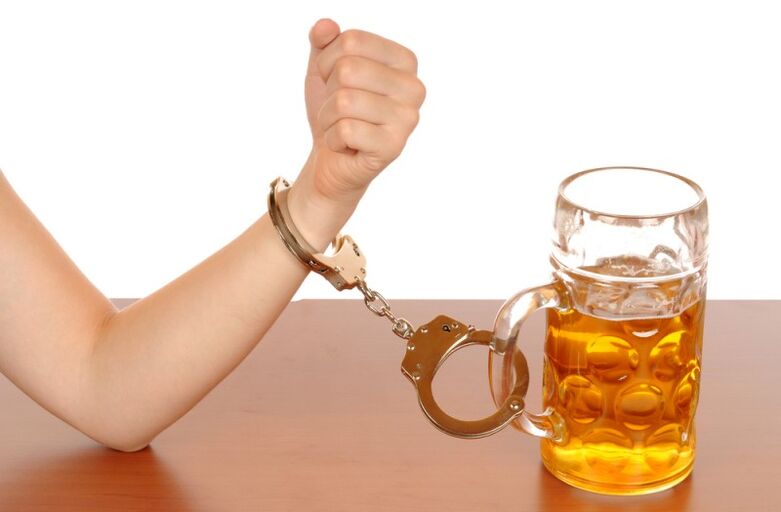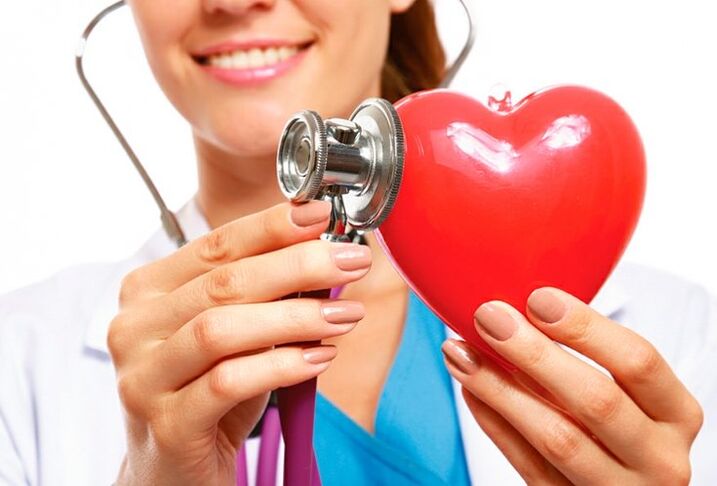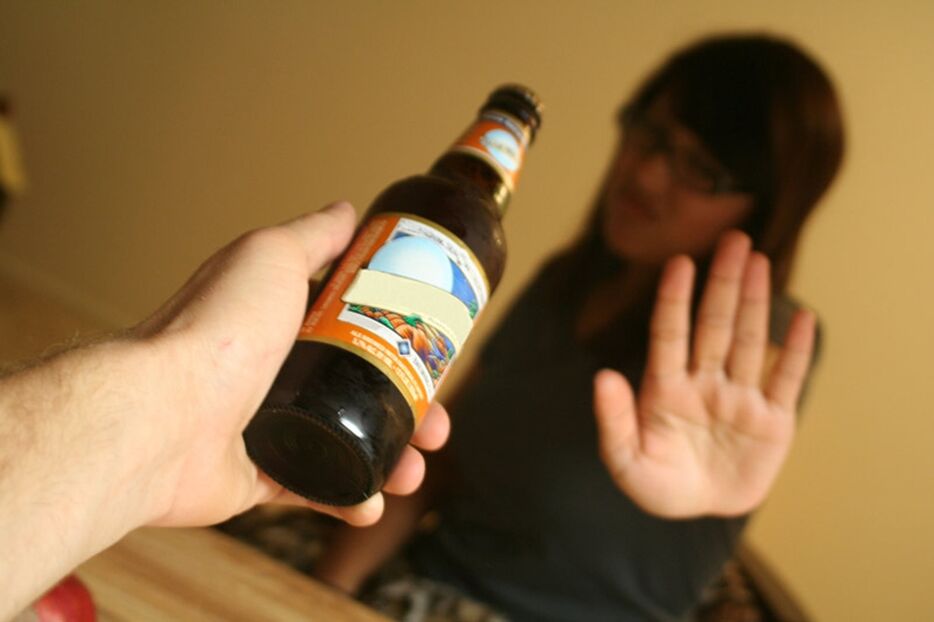Regular consumption of any alcoholic beverage can not last long without consequences. Beer alcoholism develops more slowly than strong alcohol dependence, and this is its particular danger.

What is the danger of beer
The type of alcohol is not important for the development of alcoholism. The disease occurs when drinking wine, vodka, moonshine, alcoholic cocktails and beer. The only thing that affects low-alcohol drinks is the rate of addiction. In this regard, beer is considered one of the most dangerous drinks. And therefore.
- Its alcohol content is 4 to 14%, which is not a concern for most people. Indeed, harmless drinks such as kvass or kefir also contain alcohol.
- The beer is delicious. Unlike vodka or moonlight, which you have to "push" inside, you can taste the intoxicating liquid as much as you want, and you often want to repeat the pleasure.
- In terms of popularity, beer ranks first in almost all segments of the population: men, women and teenagers drink it. Obsessive advertising is presented as an ordinary soft drink.
- In addition to alcohol, most species contain a number of substances that adversely affect the endocrine and cardiovascular systems.
If we take a closer look at the above facts, it becomes clear that there is nothing safe in this drink. Frequent drinking of beer is not condemned by society. On the contrary, there are arguments in favor of it. It is recommended to compensate for vitamin deficiency or improve digestion. For this reason, many do not have a signal of psychological cessation, which is, for example, the beginning of alcohol abuse. Drinking vodka is considered embarrassing and harmful, and drinking beer every day is just a form of relaxation. Some do not even consider it dangerous to give it to children "to improve their health. "
Signs and characteristics of beer addiction
A simple arithmetic calculation allows you to determine what threatens to drink a beer with regular drinks. 40 ml of pure ethanol in 1 liter of weak beer, in strong types - 120-140 ml. In the latter case, the daily dose of alcohol allowed for men was doubled. If you take into account that 1 liter is drunk only "to overdo" and then the amount is not calculated, it is impossible to avoid the consequences of drinking beer.

Addiction from an ordinary hobby smoothly turns into psychological dependence, and the abuser is quite confident in his well-being and does not equate himself with alcoholics, but continues to drink beer every day. You can understand the development of the disease when the following conditions appear:
- Upcoming meetings with beer cause impatience and joyful expectations, you can postpone less important work for them;
- intoxication occurs quickly and lasts a long time;
- drunk at least 1. 5 liters per day, the maximum accuracy is unknown;
- days when ordinary beer is impossible for some reason, there is irritation, the mood worsens, only a few new cans or bottles can bring it back;
- weak beer looks like water, you want to get the strongest;
- begins to feel changes in the surroundings and the appearance of the mirror: swelling of the face, swollen body, bags under the eyes, pale skin;
- shortness of breath, chest pain, rapid heartbeat more often than usual;
- I have a headache the morning after beer, I want to drink a little more to "get better".
The appearance of one of the symptoms in the background of the daily "hobby" indicates a beer addiction, the symptoms of which will be felt more strongly in the future.
Drug addicts do not recognize any specificity of alcoholism, depending on the type of drink they prefer, but agree that beer addiction is very insidious. At the initial stage, it is very difficult to determine, because there are no significant changes in lifestyle and human health. For example, a wife in a situation where her husband drinks beer every day may not feel any signs of dependence from the outside.
In men, beer alcoholism is often disguised as a somatic disorder. Heart problems, headaches and nervousness are often mistaken for accumulated fatigue.
The health effects of beer abuse
The consequences of beer alcoholism have less of an impact on intellectual, spiritual, and personal aspects. People who are addicted to alcohol, unlike those who drink heavily every day, lose less professional skills and maintain adequate behavior and judgment. This is a feature of weak alcoholic beverages: personality degradation develops, but very slowly.

Another danger that awaits beer lovers is the destruction of physical health. Severe chronic diseases develop as a result of excessive daily consumption:
- myocardial dystrophy;
- angina;
- coronary artery disease;
- gastritis;
- jade;
- fatty hepatosis;
- cirrhosis of the liver;
- neurological disorders.
Sparkling drink puts a lot of burden on the kidneys, binds and excretes minerals and vitamins necessary for the body: potassium, calcium, ascorbic acid, riboflavin. As a result, the work of all internal organs is disrupted. The constant presence of acetaldehyde in the blood causes swelling, combined with dehydration, and poisons the liver and brain.
It is important that beer contains a lot of phytoestrogens. When taken uncontrolled, these substances contribute to hormonal imbalances in both men and women, leading to reproductive system malfunctions, an increased risk of blood clots, and increased cholesterol levels.
However, the main danger of beer alcoholism is uncontrolled intoxication. The taste of the drink overshadows the effect of ethanol, inhibits the feeling of euphoria, retouches problems, encourages you to take a few more cups or bottles. When you drink beer, it rarely comes to mind. In addition, drug addicts often abuse low-alcohol vodka or other "fuels. "
Fight against beer alcoholism
How to deal with beer alcoholism depends on the degree of the disease and the situation as a whole. Given that such abuse is not always accompanied by a loss of volitional qualities and mental disorders, it makes sense for drug addicts to do all the work alone. There is no coding for beer alcoholism as a specific pathology. Sewing a medicated torpedo under the skin or under hypnosis may not work.

As with other types of addiction, the patient must recognize the current situation and the need to change it. Some can do it themselves, others will need a sign from the outside. If there is no physical dependence on ethanol - the lack of beer does not lead to deterioration of well-being, heart attacks - you can do without the help of a narcologist.
Approximate activity program.
- Medicine does not recognize "small dose" methods of treating alcoholism. It is pointless to recommend people who are addicted to beer to drink 1 glass a day. This is self-deception, after a while the problem will return. Only complete denial can help. It is necessary to act on the principle "the last time was yesterday". This is the most difficult step, but it is necessary.
- Once rejected, you need to analyze what worries you the most. Boredom, a lot of free time, uninteresting TV, stress at work, arguing with a friend. Usually, the problems with drinking beer disappear immediately. You need to identify them and start addressing them without delay: instead of watching TV, fix something, go for a walk, start a conversation with a forgotten friend, spend more time at work, with children, help at home.
- Boredom and nervousness can be eliminated by finding a job that you enjoy doing. Hobbies, new pets, playing sports, music, learning a foreign language, learning a new profession. He will do everything that is genuinely interesting, laborious, but does not leave a feeling of inner compulsion. This is the most powerful way to deal with psychological dependence.
- With an irresistible desire to drink beer, you can give the body a substitute: make juice, green tea, lemonade. Initially, a non-alcoholic version of beer is suitable. At the same time, after drinking 2-3 glasses of drink, you need to turn your attention to some urgent work. The brain will receive the necessary secretion, psychological stress will disappear. If we are not talking about alcoholism, but if we are talking about a bad habit, you can drastically reduce the amount of beer - 1-2 times a week to drink no more than 0. 5 liters, ideally less.
Lack of good mood and interest in life and frequent dizziness, weakness in the self-treatment of beer alcoholism are a reason to visit a neurologist or endocrinologist, as there is a possibility of developing metabolic disorders or damage to the central nervous system. nervous system. In this case, the doctor may order a laboratory blood test, dopplerography, MRI of the brain. If symptoms are found, treatment with hormonal or nootropic drugs should be considered.
Prevention of beer alcoholism is to exclude the replacement of entertainment with alcohol, to combat boredom, to relax and solve problems. Like other alcoholic beverages, beer is acceptable at the festive table, but you can not make it a constant companion of life or quench your thirst with it.
























